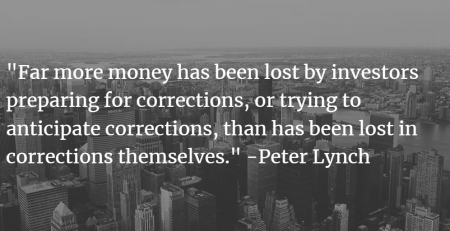The Upside of Down Markets
Stocks fell sharply this past Tuesday with the S&P 500 ending the day down 4.32%. But even with that significant fall, the S&P 500 was still slightly up over the previous week. It is safe to say that markets have been volatile in a whipsaw fashion during 2022.
As of writing, the S&P 500 is now down 16.57% YTD. While that is a significant move in isolation, it is nothing out of the ordinary relative to the massive bull market we have experienced in recent years, or the average annual 14% peak to trough decline we’ve witnessed over the last 70 years. That said, the current headline number does mask pain elsewhere in the market with certain names down 90%+ from their peak.
We at GCI have always taken a policy of indifference to short-term market moves – instead focusing on owning a portfolio of high-quality companies that can survive and thrive no matter what the short-term market environment looks like (pandemic, war, inflation, etc.).
This first principles approach of investing in businesses rather than stocks gives us a natural advantage during periods of increased volatility. When other market participants are scrambling to guess whether we are in a recession, or whether the FED will raise rates by 75 or 100 bps, we can instead calmly assess the prospects of our underlying businesses over the next 3, 5, and 10 years.
Often, what we find is that the prospects for our holdings are getting better at the same time their stock prices are falling. While it is never fun to see stock prices fall, we do believe that market corrections are necessary and ultimately good for an investor’s long-term performance.
In particular, there are two key benefits resulting from market corrections – firstly, that excesses get corrected, and secondly, that new opportunities are created.
Bear Markets Alleviate Excesses
Counterintuitively, markets that are flush with liquidity (most markets for the past decade) are not necessarily the best environment for best-in-class businesses to thrive. This is because easy liquidity allows non-economical competitors to survive longer than they would otherwise.
Capitalism at its best is simply an economic system to reward enterprises that create value for society, and to punish those that don’t. We would argue that the easy money policies of this past decade have made the later part of the statement less true – in that unprofitable companies have not been punished, they have instead been able to thrive on this easy liquidity. Perhaps that situation is now changing as asset prices come down, interest rates rise, and liquidity is slowly withdrawn.
Consider the bubble-like valuations we have seen in relatively unproductive sectors of our economy – whether that be profitless growth companies, or the middlemen who were happy to use those excesses to launch SPACs or “Innovation” funds, or the amount of capital and talent that has been wasted in the cryptocurrency space.
As a reminder, we do not have higher standards of living than the Kings of old because we have more gold or magical internet money than those kings had, but rather because we have a more productive economy that can produce more of the goods and services that we demand.
So, while market corrections are difficult in the moment, it is important to remember that they are necessary to filter out the productive enterprises from the unproductive enterprises.
We always strive to maintain positions in companies that can not only survive these downturns, but which will ultimately do better going forward than they would have otherwise, as they are able to use market volatility to both buyback their shares at depressed prices, as well as consolidate their markets as less robust competitors retreat. This brings us to the next point.
Bear Markets Create Opportunities
We have been in this industry for a long time, and it still amazes us how quickly market participants will sell down otherwise great investments simply because they have a negative view over the next quarter or 12 months. Every time this has happened in the past – whether it was due to a recession scare, a geopolitical crisis, or monetary policy – it has turned out to be a great buying opportunity for those who could rationally buy on a longer timeframe.
Why is this always the case? Surely there are very smart individuals on Wall Street that understand the fundamental truth that when stock prices go down, all else equal, their forward returns go up? There are two main reasons.
Firstly, most of Wall Street makes their money based on assets under management, not on performance – so they are incentivized to simply gather more and more clients with actual performance being a secondary goal. As such, the key priority for these firms is to avoid losing clients, which means reducing short-term volatility. This results in panic selling at the drop of a hat, as any short-term underperformance cannot be tolerated.
Secondly, the vast majority of the investment industry uses volatility as their measure of risk (we’ve written in detail about how fundamentally wrong that is here). The main result of this approach is that any price declines are exacerbated by risk models telling portfolio managers they must sell more of whatever is falling in price. What happens is as follows: share prices fall, which causes mathematical volatility to rise, so risk models tell portfolio managers they have to sell more stock to reduce their risk, and then these additional stock sales drive prices lower still, which causes volatility to rise further, etc., etc.
This blatant ignorance of logic has persisted for decades, with little sign of change. And while entirely unhelpful for the very clients it claims to protect, this feature of markets does create opportunities for the genuine investor.
Conclusion
Whatever the reason for these sell-offs – bear markets in high-quality companies are ultimately a good thing for us and any other long-term investors. Our businesses get the benefit of seeing some of their competitors disappear, and then we get the benefit of being able to secure higher future investment returns by buying these high-quality companies at lower prices.
In very deep bear markets, like that we saw during the Covid crisis, we may even get the opportunity to significantly change our portfolio, as high-quality companies that we couldn’t own before reach valuations where we can finally be owners. Our recent purchase of Copart is one such example.
Disclosures: This website is for informational purposes only and does not constitute an offer to provide advisory or other services by GCI Investors in any jurisdiction in which such offer would be unlawful under the securities laws of such jurisdiction. The information contained on this website should not be construed as financial or investment advice on any subject matter and statements contained herein are the opinions of GCI Investors and are not to be construed as guarantees, warranties or predictions of future events, portfolio allocations, portfolio results, investment returns, or other outcomes. Viewers of this website should not assume that all recommendations will be profitable, or that future investment and/or portfolio performance will be profitable or favorable. GCI Investors expressly disclaims all liability in respect to actions taken based on any or all of the information on this website.
There are links to third-party websites on the internet contained in this website. We provide these links because we believe these websites contain information that might be useful, interesting and or helpful to your professional activities. GCI Investors has no affiliation or agreement with any linked website. The fact that we provide links to these websites does not mean that we endorse the owner or operator of the respective website or any products or services offered through these sites. We cannot and do not review or endorse or approve the information in these websites, nor does GCI Investors warrant that a linked site will be free of computer viruses or other harmful code that can impact your computer or other web-access device. The linked sites are not under the control of GCI Investors, and we are not responsible for the contents of any linked site or any link contained in a linked site. By using this web site to search for or link to another site, you agree and understand that such use is at your own risk.
All references and views offered including but not exclusive to any overall market commentary, asset class, attribution, outlook, valuation, potential returns, stocks, companies, business model, quality, outlook, management, valuation, execution, potential returns, investments, investment styles, market returns, expectations, forecasts or estimates and any other area of investing are the opinion of the manager and should not be taken as facts, projections or guarantees. All such opinions are subject to change are do not constitute a recommendation or solicitation to buy or sell a particular security.






